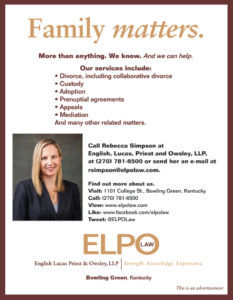
by Rebecca Simpson
Expanding your family through adoption or assisted reproductive technology is an exciting and important decision. The joys that children bring to your life are immeasurable, and understanding the legalities of both of these ways of expanding your family is crucial to avoiding bumps along the road of family expansion. Both adoption and assisted reproductive technology involve complex legal issues that an experienced attorney can assist you with.
There are many different ways to expand your family, so it is important to understand the differences in order

to determine what works best for your family.
Adoption through foster care
Many parents wishing to adopt begin the process by becoming foster parents. Each year, thousands of child
ren throughout Kentucky place in foster care due to abuse or neglect. When these children cannot be reunified with their parents or placed with relatives, many foster parents choose to adopt. While this process can take a long time, the rewards to the children and to the parents can be immeasurable.
Adoption through an agency
Many parents choose to adopt through a private agency, especially when the family is adopting a child from another country. Due to the complexities of international adoptions, families in Kentucky who wish to adopt a child from another country typically contact a private adoption agency, licensed in Kentucky.
Private agencies are also involved in many domestic adoptions. For a number of reasons, using a private agency to assist with the adoption process can be helpful. Agencies are familiar and experienced with the adoption process. However, the costs associated with private adoption agencies can be high, and many agencies are very selective regarding adoptive parents.
In both cases, it is important to research the agency and ensure that it is legitimate, licensed and reputable.
Independent and relative adoptions
Some families choose not to use a private adoption agency and are not part of the foster care system. These adoptions are referred to as independent adoptions. For most independent adoptions, an attorney drafts the court docum
ents and advises the adoptive parents through the adoption process.
Some children are adopted by relatives. Under the law, relative adoption occurs when the child is “sought to be adopted by a stepparent, grandparent, sister, brother, aunt, uncle, great grandparent, great aunt, or great uncle.” Fewer requirements must be met prior to filing a Petition for Adoption in relative adoptions.
Assisted reproductive technology
Assisted reproductive technology (ART) through in vitro fertilization provides another option for families who want to expand but cannot conceive a child without medical assistance. Over the years, family expansion through ART has become increasingly more common among single parents, heterosexual and same-sex couples, yet Kentucky law surrounding ART still remains largely undefined.
Some families bring children into their families through a gestational surrogate, which is one use of ART. Gestational surrogacy involves a woman who carries a pregnancy and gives birth to a child for another woman or a couple. A woman who serves as a gestational carrier has no biological relationship to the embryo, which is created and implanted through the process of in vitro fertilization. Gestational surrogacy is permitted in Kentucky, as it is not prohibited by Kentucky statute or case law. Traditional surrogacy, in which the surrogate herself provides the eggs and is therefore genetically related to the child, is prohibited under Kentucky statute.
One of the most important legal aspects of ART is establishing parentage. For instance, when a gestational carrier is involved, intended parents need to take legal measures to ensure that the child produced through ART is established as their legal child, since the gestational carrier is not biologically related to the child.
In some jurisdictions, courts allow intended parents to obtain a pre-birth order establishing certain rights such as permitting the intended parents to be named as parents on the child’s birth certificate, permitting the intended parents to visit with the child in the hospital after birth and permitting the intended parents to take the child home. Other jurisdictions do not grant pre-birth orders.
Research your options
Bringing a child into your life is one of the most important decisions you will make. Understanding your options and the legal processes involved in each process is crucial. An important first step is consulting an attorney to answer your questions regarding each process.
About the Author:
Rebecca Simpson is a Senior Attorney with English, Lucas, Priest & Owsley, LLP, where she handles family law matters. Rebecca and her husband, Jamie, reside in Bowling Green where they are raising their two daughters. Contact Rebecca at rsimpson@elpolaw.com or 270-781-6500.



